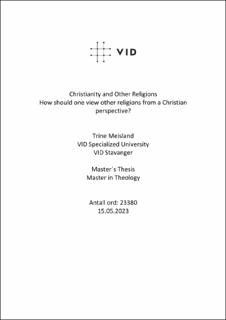| dc.description.abstract | How should one view other religions from a Christian perspective? In my thesis I look at three central theologians, who each belong to one of the main approaches to other religions. Hick belongs to the pluralist approach, Rahner to the inclusivist approach, and Kraemer to the exclusivist approach. Each of Hick, Rahner and Kraemer’s view is presented, based on their particular work. Their view is then analyzed according to the criteria of Tomas Nygren, which are Bible, coherence, and relevance. The Bible criterion is the most important one, in finding a Christian approach to other religions.
I have found that these three theologians view other religions quite differently. Hick sees other religions as worshipping the same God as the Christian does and views other religions as valid paths to salvation. Rahner views other religions as containing grace and supernatural elements on account of Christ. He claims that one can have a saving relationship with God through these other religions until the gospel becomes a real historical factor in one´s history and culture. Rahner claims that there is only one salvation, and this is the salvation in Christ. Kraemer says that Jesus is the revelation in his own person and is thus different than the founders in the other religions. He views other religions as a quest for self-justification, self-redemption, and self-sanctification, and stresses Jesus being universal. Kraemer says that other religions are essentially in error, but that one should look for God having revealed himself in other religions, as well as searching for demonic elements.
Hick´s work is the least Biblical. He has strong inner coherence but is irrelevant for the Christian fellowship. He is however relevant for the culture. Rahner´s view is more biblical than Hick, however he goes further than the Bible, and his work cannot be rooted in the Bible. Some is also contrary to the Bible. Rahner lacks inner coherence and is irrelevant for both the culture and the Christian fellowship in speaking of anonymous Christians. Kraemer uses most biblical material, and mostly uses it in a good way. He can be critiqued on a few points when it comes to inner coherence. Kraemer is of relevance for the Christian fellowship, however, fails to be of relevance for the culture. Jesus is different than the founders in the other religions by being the revelation in his own person, and other religions should be viewed as self-justification. | en_US |
